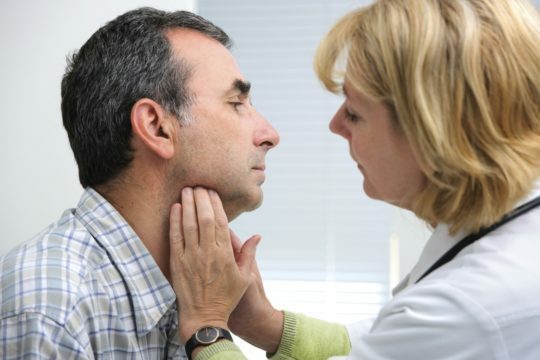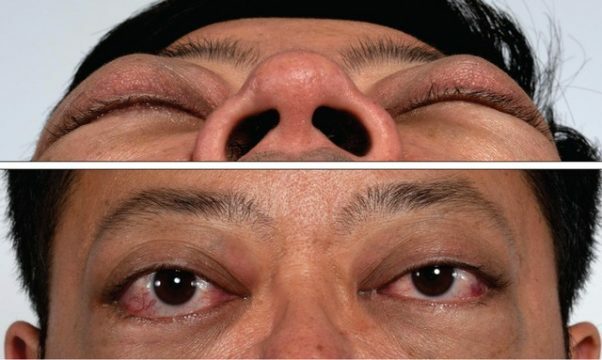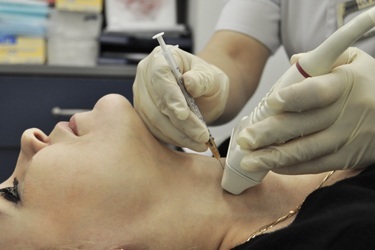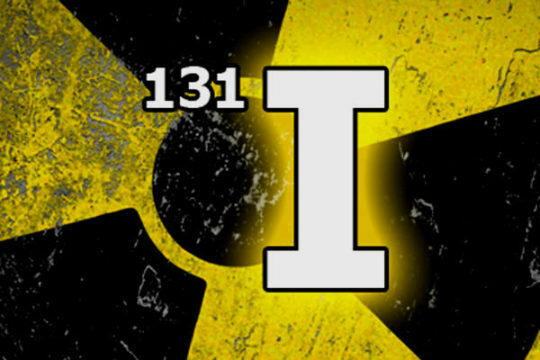If the amount of hormones produced by the thyroid gland exceeds the normative indices, then thyrotoxicosis develops. This is a dangerous syndrome, indicating the development of various endocrine diseases. Different are the causes of thyrotoxicosis. In this case, the severity of its clinical manifestations is due to the extent to which the permissible levels of hormones are exceeded.

Reasons for
The production of thyroid hormones is controlled by the pituitary gland. For this purpose, the body produces a special thyroid-stimulating hormone( TSH).If the amount of the main hormones produced by the thyroid gland, thyroxine( T4) and triiodothyronine( T3) decreases, the level of TSH is increased in order to stimulate the thyroid gland. On the other hand, with an increase in thyroid hormone production, the pituitary gland reduces the production of TSH.If, due to any violation in the human body, such a connection between hormones breaks, then a hormonal failure occurs. In thyrotoxicosis, a significant increase in the number of thyroid hormones is found, against a background of a decrease in the thyroid-stimulating hormone level.
The causes of the pathology are as follows:
- Diffusive-toxic goiter, better known as Bazedova's disease. At the same time, autoimmune disorders provoke the production of antibodies that destroy healthy cells.
- Toxic adenoma, when a knot is formed in the tissues of the organ, which produces additional hormones. This pathology is usually age-related and is diagnosed in older people.
- An autoimmune or viral thyroiditis that causes destruction of the body cells. Benign tumors of the pituitary gland.
- Injuries of thyroid gland or transferred operations on it.
- Use of iodine-containing drugs for the treatment of various diseases.
- Excessive intake of hormones from the outside, when certain diseases are treated with special hormonal drugs.
Symptoms of
The increased level of hormones is dangerous because it can provoke dangerous disorders in the functioning of important organs and systems of the human body. In women, this syndrome is observed much more often in comparison with men. In general, pathology is observed during hormonal changes, such as puberty, pregnancy, the postpartum period and the period of decline in reproductive function.

Obvious symptoms of thyrotoxicosis:
- Rapid weight loss on the background of unchanged diet and stable physical activity.
- Increased sweating, unexplained by external environmental conditions or loads.
- Feels hot in the body.
- Puffiness.
- Pulse rate, without any pathology in the cardiovascular system.
- The tremor of various parts of the body with the exception of atherosclerosis of the vessels of the brain or lesions of the nervous system.
- Weakness, which leads to rapid fatigue.
- Increases the fragility of bones, which provokes frequent fractures.
Symptoms of thyrotoxicosis are also manifested by the nervous system. With an increase in the level of hormones a person becomes irritable, he suffers from headaches and develops insomnia. People suffering from thyrotoxicosis are always hot-tempered and fussy, they are disturbed by the function of attention and memory.
Signs in thyrotoxicosis can be considered a decrease in libido, both in women and men. On the background of hormonal failure, infertility often develops. Symptoms of thyrotoxicosis in women are supplemented by a possible violation of the menstrual cycle. With this pathology, pregnancy, as a rule, ends with premature miscarriage. If you manage to tolerate a child with thyrotoxicosis, the birth can go without complications. The only feature can be their fleetingness, which should be properly prepared for both obstetricians and the parturient child. But in this case, after childbirth on the first day, a thyrotoxic crisis may develop, which leads to an increase in pressure and the development of severe uterine bleeding that threatens the life of a woman.

Eye symptoms with thyrotoxicosis are not always evident. They are characterized by protrusion of eyeballs or a wide opening of the eyes, which gives the person's face an expression of fright or surprise.
Diagnostics
In order to conduct the correct treatment of thyrotoxicosis, all symptoms must be taken into account and deep diagnostics should be carried out in order to establish the causes of the hormonal failure. To do this, you first need to confirm the elevated levels of thyroid hormones in your blood by performing an appropriate blood test. With the development of the syndrome, the results of the study will confirm the increased amount of T3 and T4 homonids on the background of a decrease in the level of the hormone TSH.
Before administering thyrotoxicosis, other laboratory and instrumental studies are conducted to determine the causes of the development of the pathology:
- For the elimination or confirmation of the autoimmune nature of the hormonal failure, antibodies are tested.
- US of the thyroid gland allows to determine the size of the thyroid gland and, consequently, to confirm and eliminate the development of diffuse toxic goiter, which is the most common cause of thyrotoxicosis.
- Thyroid scintigraphy allows you to determine the ability of the thyroid gland to capture iodine.
- Thyroid gland puncture is performed if there is a suspicion of a malignant tumor in the tissues of the thyroid.

Treatment of
Treatment of thyrotoxicosis, the development of which is always due to increased thyroidal production, hormones involves the use of different approaches. It is possible to cure this pathology forever, but the doctor must first make sure that the human body is strong enough for the chosen method of treatment, and it will not lead to complications.
All medical appointments are carried out based on the results of diagnosis, taking into account the state of the person. It is important to consider the presence of other chronic diseases. For successful treatment, it is necessary to provide for general strengthening measures, monitor diet and observe the rules of a healthy lifestyle.
Today there are three main methods used:
- Conservative;
- Surgical;
- Treatment with radioactive iodine.
Conservative technique provides for the use of thyreostatic medications that suppress the activity of the thyroid gland. It is important to apply prescribed medications in a timely manner and regularly visit an endocrinologist. At the initial stages of the disease, an effective drug is tyrosol. Use it is possible only after the appointment of the attending physician. It must be remembered that this medicine is unsafe. When it is overdosed or improperly used, damage to health can be caused.
The surgical method involves the excision of part of the thyroid gland. Such a method is indicated in the development of a large node in the tissues of the thyroid, which leads to increased production of hormones. Undoubtedly, the decision to carry out the operation is always taken when confirming the presence of a malignant tumor.

The use of radioactive iodine to eliminate hormonal failure is considered a very effective and affordable way. In the process of treatment, a single intake of a special capsule containing radioactive iodine is contemplated. The procedure for treatment with radioactive iodine is based on the fact that this element is absorbed exclusively by thyroid cells. Radiation for about a week destroys some of the thyroid cells that are replaced with a connective tissue. This, accordingly, leads to a decrease in the production of hormones. The procedure for using radioactive iodine leads to irreversible changes in the thyroid gland, therefore such treatment by its action can be compared with surgical intervention. The danger of this method is that it can lead to hypothyroidism, and, consequently, to the need for replacement therapy after such treatment throughout life.
Relapses after proper conservative treatment are rare. As a rule, they happen only in case of non-compliance with the prescriptions and recommendations of the doctor. But if the recurrence is repeated, then the operation is recommended.
Complications of
If laboratory and instrumental diagnostic studies have confirmed thyrotoxicosis, then this pathology must be treated. If this is not done, then it threatens the development of dangerous complications. In particular, the threat to human life is the thyrotoxic crisis. It can be provoked by stress, transmitted infectious diseases or surgeries. The clinical manifestations of thyrotoxic crisis are very severe. During an attack, the following can be observed:
- Body temperature up to 40º;
- High blood pressure;
- Tachycardia;
- Acute congestive heart failure;
- Dyspeptic disorders.
If a person with thyrotoxic crisis does not receive timely assistance, the above symptoms will lead to violations in the work of many vital organs and systems. This in turn can lead to death.



